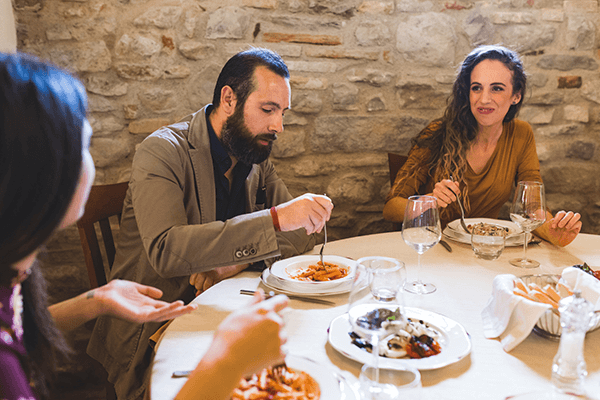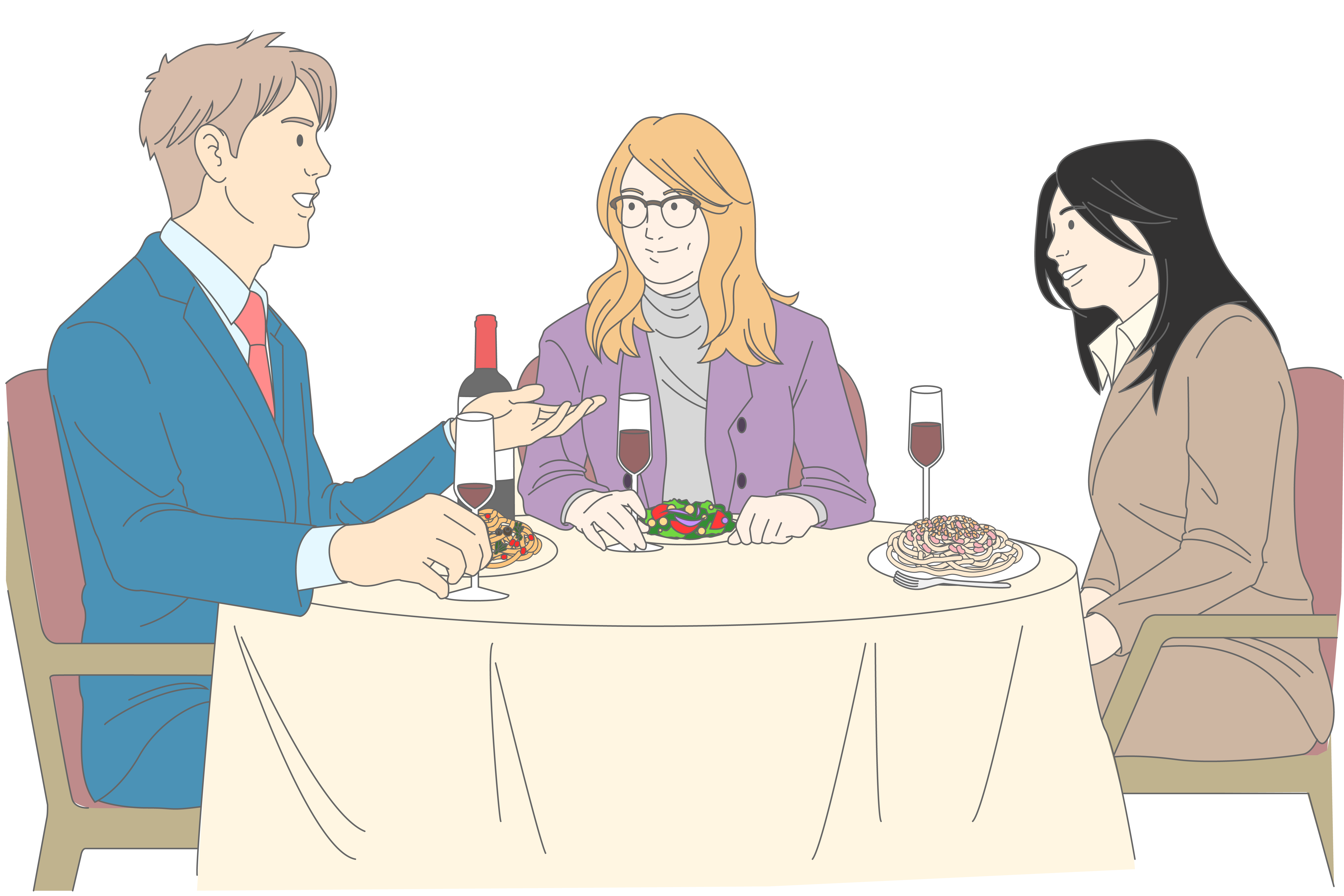INTRODUCE
Italian food is extremely popular all over the world, but Italian table manners, on the other hand, are not known to many outside of Italy.

PRESENT
STEP A EXPRESSIONS
Go over the first two expressions with your tutor and answer the questions. Then, guess the meaning of the third expression based on the clues provided.
1. A faux pas is an embarrassing or offensive mistake in etiquette, manners, or conduct.
Do you think it’s okay to wear a white dress at Camilla’s wedding?
No way! It’s a faux pas to wear white at somebody else’s wedding!
Q: Which do you consider to be a bigger faux pas in Japan?
|
|
2. A common courtesy is politeness or etiquette a person is expected to show.
Dude, pick up your trash. It’s a common courtesy to clean up after yourself!
What are you talking about? That’s not mine!
Q: Do you think giving your seat to a child on the train is a common courtesy?
|
|
3. .
Can I touch these paintings? I just want to feel their texture.
Sorry, it’s a big no-no to touch the paintings. The oil from your hands can ruin them.
Q: What do you think a big no-no means?
STEP B SPEAK YOUR MIND
Sometimes you want to share unexpected yet amusing information.
Hey, did you hear? Ben and Kate broke up after dating for only 2 weeks.
Yeah, Ben told me they broke up because he hated being in a relationship. But interestingly enough, I heard he’s now dating Nancy!
UNDERSTAND
SPEAKING
Kaori is in Venice for a business trip. She’s having lunch with two Italian coworkers at a restaurant.
 |
- Aldo:
Hmm… Smells good! So, shall we eat?
- Kaori:
Alright! Buon appetito!
- Teresa:
(laughs)
- Kaori:
Why? Did I say it wrong?
- Aldo:
No. It’s just that tourists always say buon appetito before eating when they come to Italy, but interestingly enough, that’s kind of a faux pas here.
- Kaori:
Oh, really? I thought it was just like saying itadakimasu in Japan! It’s not a good thing?
- Teresa :
No, not at all! Buon appetito actually has a negative connotation and isn’t polite in formal situations. Royalty used to say it to their servants to imply that they should be thankful for the meal because it could be their last.
- Kaori:
I had no idea! Sorry about that. Oh, let me pour you some more wine, Aldo!
- Aldo:
Oh, don’t worry! You’re our guest.
- Kaori:
It’s no problem! In Japan, it’s actually a common courtesy to pour your companion’s drinks.
- Aldo:
Well, in that case, thank you. Anyway, are you done eating? I think you should have some more. We still have a long day!
- Kaori:
It was delicious, but I’m stuffed.
- Teresa:
No problem. By the way, Kaori, I hope you don’t mind me saying this, but I noticed that your hands are under the table. It’s actually a big no-no to do that here. It’s better to keep them on top of the table where they can always be seen.
- Kaori:
Whoops, sorry!
- Aldo:
No problem. Anyway, I bet you’re looking forward to telling us all about table manners in Japan when we visit you there later this year. (laughs)
- Kaori:
Yes, very much so! (laughs)
TRIVIA
Did you know that the abbreviation NG is actually Japanese English? While the letters come from the English phrase not good, the abbreviation itself is not used by native speakers. Other abbreviations not used by native English speakers include CM (commercial), PV (promotional video, commonly called a music video), and VTR (video tape recording, commonly called a clip).

PRACTICE
Follow the instructions in parentheses using the pictures and the expressions in the box. Some expressions may be used more than once.

1. (Tell your tutor one unacceptable thing to do on a train.)

2. (Tell your tutor one polite thing to do before entering someone else’s house.)

3. (Tell your tutor one thing that can offend people during a meal.)

4. (Tell your tutor one usual mistake done by tourists.)

5. (Tell your tutor one respectful thing to do when meeting someone new.)
CHALLENGE
Challenge 1
You live in Italy. Your Italian boyfriend/girlfriend invited you and your roommate to a dinner party next Saturday. Tell your roommate about the dinner party and answer his/her questions about etiquette.
Today's Expressions
- a faux pas
- a common courtesy
- a big no-no
Speak Your Mind
- Interestingly enough, …
| ITALIAN ETIQUETTE | |
|---|---|
DO
|
DON’T
|
 |
Challenge 2
What do you think? What does your tutor think? Discuss.
 If Time
If TimeAllows
1 TABLE MANNERS |
2 THE PROPER WAY TO EAT |
|---|---|
|
1 TABLE MANNERS
|
2THE PROPER WAY TO EAT
|
FEEDBACK
I can discuss table manners.
LESSON GOAL ACHIEVEMENT
-
4
Very GoodCould complete the task with ease
-
3
GoodCould complete the task with some clarifications
-
2
FairCould complete the task with additional instructions
-
1
PoorCould somehow complete the task with difficulty
PERSONALIZED FEEDBACK
- RANGE
the ability to use a wide variety of vocabulary - ACCURACY
the ability to speak correctly - FLUENCY
the ability to speak smoothly without pauses or fillers - INTERACTION
the ability to manage a conversation
 talking on the phone on a train
talking on the phone on a train entering a house with shoes on
entering a house with shoes on Yes, of course!
Yes, of course! Not really. Children can stand.
Not really. Children can stand.
